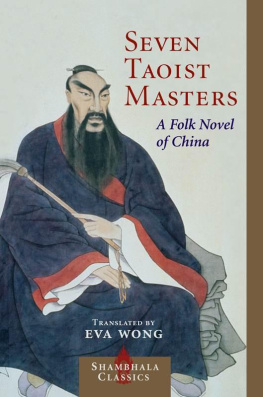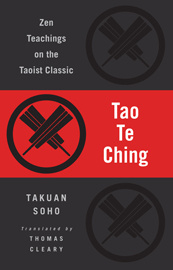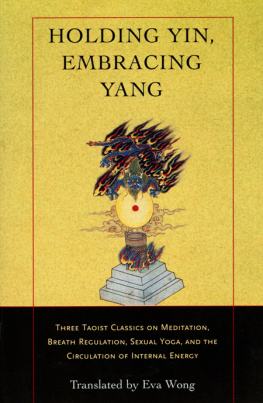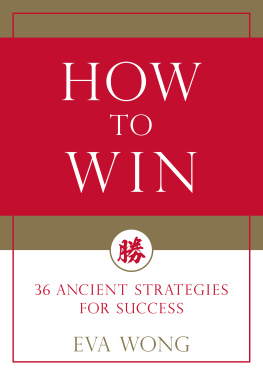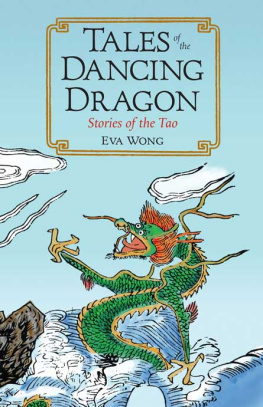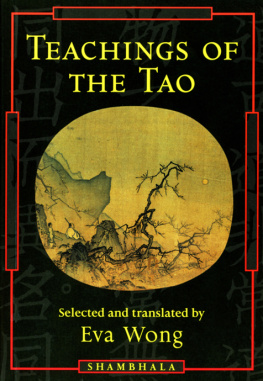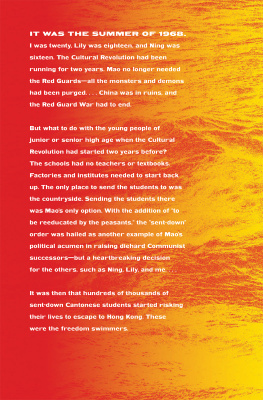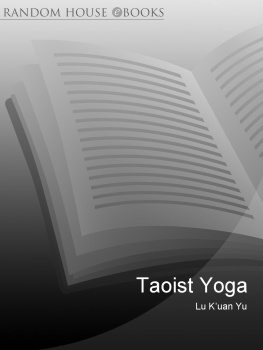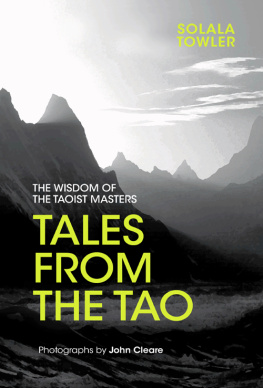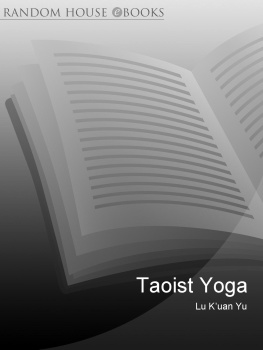Eva Wong - Seven Taoist Masters: A Folk Novel of China
Here you can read online Eva Wong - Seven Taoist Masters: A Folk Novel of China full text of the book (entire story) in english for free. Download pdf and epub, get meaning, cover and reviews about this ebook. year: 2004, publisher: Shambhala, genre: Detective and thriller. Description of the work, (preface) as well as reviews are available. Best literature library LitArk.com created for fans of good reading and offers a wide selection of genres:
Romance novel
Science fiction
Adventure
Detective
Science
History
Home and family
Prose
Art
Politics
Computer
Non-fiction
Religion
Business
Children
Humor
Choose a favorite category and find really read worthwhile books. Enjoy immersion in the world of imagination, feel the emotions of the characters or learn something new for yourself, make an fascinating discovery.
- Book:Seven Taoist Masters: A Folk Novel of China
- Author:
- Publisher:Shambhala
- Genre:
- Year:2004
- Rating:3 / 5
- Favourites:Add to favourites
- Your mark:
- 60
- 1
- 2
- 3
- 4
- 5
Seven Taoist Masters: A Folk Novel of China: summary, description and annotation
We offer to read an annotation, description, summary or preface (depends on what the author of the book "Seven Taoist Masters: A Folk Novel of China" wrote himself). If you haven't found the necessary information about the book — write in the comments, we will try to find it.
Seven Taoist Masters: A Folk Novel of China — read online for free the complete book (whole text) full work
Below is the text of the book, divided by pages. System saving the place of the last page read, allows you to conveniently read the book "Seven Taoist Masters: A Folk Novel of China" online for free, without having to search again every time where you left off. Put a bookmark, and you can go to the page where you finished reading at any time.
Font size:
Interval:
Bookmark:
ABOUT THE BOOK
History and legend are interwoven in this folk novel that both entertains and instructs. Written by an unknown author, Seven Taoist Masters is the story of six men and one woman who overcome tremendous hardships on the journey to self-mastery. These characters and their teacher, Wang Chung-yang, are all historical figures who lived in the Southern Sung (11271279) and Yuan (12711368) dynasties. Wang is regarded as the greatest patriarch of the Complete Reality school, a highly purified branch of Taoism having a strong affinity with Zen Buddhism. The novel brings to life the essentials of Taoist philosophy and practice, both through the instructions offered by Wangon topics such as the cultivation of mind and body, meditation techniques, and overcoming the obstacles to enlightenmentand through the experiences of the characters.
EVA WONG is an independent scholar and a practitioner of the Taoist arts of the Pre-Celestial Way and Complete Reality lineages. She has written and translated many books on Taoism and related topics, including A Master Course in Feng-Shui; Tales of the Taoist Immortals; The Tao of Health, Longevity, and Immortality; and Taoism: An Essential Guide .
Sign up to learn more about our books and receive special offers from Shambhala Publications.

Or visit us online to sign up at shambhala.com/eshambhala.
SEVEN TAOIST MASTERS
A Folk Novel of China
Translated by Eva Wong

SHAMBHALA
Boston & London
2012
Shambhala Publications, Inc.
Horticultural Hall
300 Massachusetts Avenue
Boston, Massachusetts 02115
www.shambhala.com
1990 by Eva Wong
Cover Art : Painting of Immortal L Tung-pin.
From the main altar of Fung Loy Kok Taoist Temple, Denver, Colorado. Photographed by ProLab.
All rights reserved. No part of this book may be reproduced in any form or by any means, electronic or mechanical, including photocopying, recording, or by any information storage and retrieval system, without permission in writing from the publisher.
The Library of Congress catalogues the previous edition of this work as follows:
Seven Taoist masters: a folk novel of China/translated by Eva Wong.1st ed.
p. cm.
eISBN 978-0-8348-2526-0
ISBN 0-87773-544-1 (alk. paper)
ISBN 1-59030-176-5 (Shambhala Classics)
1. Spiritual life (Taoism) I. Wong, Eva, 1951
BL1923.S44 1990
299.5144dc20 89-43307
CIP
To my respected teacher, Mr. Moy Lin-shin,
who showed me the path of
the return to the origin
Contents
I would first like to thank my teacher, Master Moy Lin-shin, for giving me the teachings of the Tao. Through him I have learned to live a more meaningful life. I owe him my health and my wellness of being, and, most important of all, through his example I have learned compassion and selflessless.
Also, many thanks to my friend and fellow temple member Karen Laughlin for reading through the early version of the manuscript and making valuable comments and suggestions.
Finally, thanks to the many members of Fung Loy Kok Taoist Temple and the Taoist Tai Chi Society who have supported the temples Translation Committee. Without their encouragement, this work would not have been possible.
In the spring of 1981 I met a man who would change the course of my life forever. His name is Moy Lin-shin; he is a Taoist monk who emigrated to Canada from Hong Kong. It was through him that I was initiated into a Taoist temple and received the teachings of the Tao.
As a child growing up in Hong Kong, I was fascinated by stories of Taoist masters and immortals. When I began my study of the Chinese classics at age fourteen, I was strangely drawn to the Taoist philosophy of Chuang-tzu and Huai-nan-tzu and had no interest in the romantic poetry and novels that were popular with youngsters my age. Throughout my adolescent years, while I studied the I Ching and the geomantic art of feng-shui with my granduncle, I also gained some knowledge of the more obscure texts of the Taoist canon. But I was told that if I wanted to pursue Taoist training seriously, I needed to find a Taoist master. When I finished high school in Hong Kong, my parents decided that I should pursue a college education in the United States. During my university years in Boston and New York City, I tried to find a Taoist teacher but failed. Then, through a number of unexpected circumstances, I moved to Buffalo and met Moy Lin-shin at a meditation workshop at a local tai-chi club. In my first encounter with him I knew intuitively that this man would be my teacher, and that I would entrust to him my spiritual growth and development. The mutual acceptance and trust that formed the bond of a master-disciple relationship was forged, and before he left he encouraged me to visit him in Toronto as often as I could. Within a year of our meeting I was initiated into the Taoist temple he had cofounded, and soon after that I was allowed to address him as Sifu (Respected Teacher). In 1987, I began to travel with my Sifu in North America, Europe, and Australia, acting as an assistant and interpreter at his tai-chi and chi-kung workshops. Then in the summer of 1988, while I was assisting him at a one-week seminar on Taoism, he said to me, You must translate the book called Seven Taoist Masters, for it is one of the best introductions to the teachings of Taoism. At the conclusion of the seminar I returned to my home in Colorado and began working on the translation.
Seven Taoist Masters is a manual of Taoist training written in the form of a popular novel. The Taoist sages know that the best way to teach the philosophy and principles of training in Taoism is to present the material in a way that captures the interest of the reader. Storytelling had been used very effectively in China to convey Buddhist and Taoist teachings. As the novel emerged during the Ming dynasty (13681644) as a form of literary expression, it became an ideal vehicle for introducing abstract and often esoteric teachings of Taoism and Buddhism to the general populace. Moreover, since novels were written in the vernacular rather than in classical Chinese, knowledge that had previously been available only to the scholar-aristocracy was now open to the less educated. As a result, books such as Journey to the West, Heroes of the Marsh, Seven Taoist Masters, and Romance of the Three Kingdoms enjoyed tremendous popularity with the Chinese people and became household tales that every Chinese child grew up with.
The authorship of Seven Taoist Masters is unknown. The literary style suggests that it was written during the middle part of the Ming dynasty (circa 1500). The novel developed from storytelling, which itself can be traced back to the saga-songs of Mongol (Yan) culture. The sympathetic attitude toward the Yan emperor in the novel also suggests that the text was written during a time when the memory of the atrocities of the Mongol emperors had faded.
Many Taoist stories trace a history of oral transmission before their appearance in written form. Unlike the tales of the Lieh Tzu, which were transmitted orally for several hundred years before they were collected in written form, Seven Taoist Masters probably originated in storytelling but was written and published shortly after it attained popularity. Its literary style differs from that of true novels like Journey to the West and Heroes of the Marsh in that it contains phrases reminiscent of mnemonics used by blind storytellers.
In Seven Taoist Masters, the experiences of Wang Chung-yang and his seven disciples describe the appropriate personal attitude and environmental settings needed for Taoist training, as well as the obstacles typically encountered on the path to enlightenment. Wang Chung-yang and his disciples were historical figures who lived in the eras of the Southern Sung (11271279) and Yan (12711368) dynasties. History records that the disciple Chiu Chang-chun was befriended by Kublai Khan and was appointed court high priest during the reign of the first Yan emperor, Tai Tzu. His successors continued to be favored by Chinese emperors through the Ming and Ching (16451911) dynasties. Seven Taoist Masters weaves history and legend together to tell a tale that entertains as it instructs.
Next pageFont size:
Interval:
Bookmark:
Similar books «Seven Taoist Masters: A Folk Novel of China»
Look at similar books to Seven Taoist Masters: A Folk Novel of China. We have selected literature similar in name and meaning in the hope of providing readers with more options to find new, interesting, not yet read works.
Discussion, reviews of the book Seven Taoist Masters: A Folk Novel of China and just readers' own opinions. Leave your comments, write what you think about the work, its meaning or the main characters. Specify what exactly you liked and what you didn't like, and why you think so.

